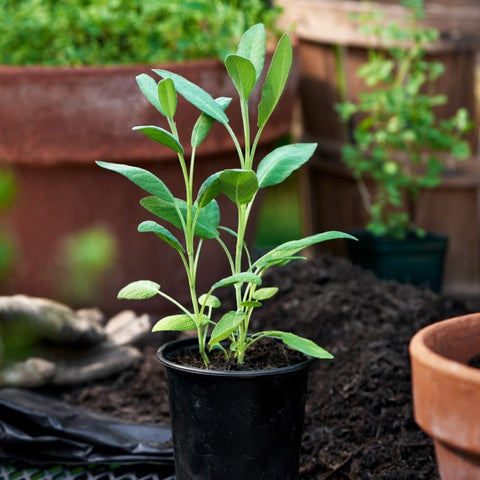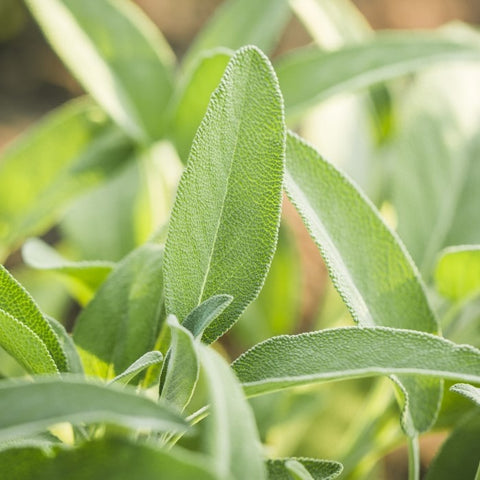Broadleaf Sage
Salvia officinalis

Overview
Uses: Herb: can be used fresh or dried. May also be used for landscaping and as an indoor or outdoor potted plant.
Benefits: Attracts pollinators such as bees and butterflies. Has beautiful leaves and flowers.
USDA Hardiness Zones: 4 - 9
Sun: Full to Partial (suggest at least 6 hours of sun daily)
Life Cycle: Perennial
Mature Height: 30"
Mature Width: 24"
Bloom Season: Early Summer to Summer
Summary
Broadleaf Sage is known for its broad greenish-silver leaves, beautiful light purple flowers, and of course—its versatile and delicious use as a herb!
In addition to its use as a perennial when grown in appropriate zones, Broadleaf Sage is also quite popular as a potted plant. In such a situation, it's one of the best herbs for growing indoors and on your patio.
Care
Broadleaf Sage Plant Care
Provide at least 6 hours of full sun daily.
Water regularly after planting or repotting, keeping soil moist but not wet until the plant is established.
Established sage does best with the minimal amount of water and fertilizer required to keep it alive. Over watered and over fertilized sage seems to not have a taste as delicious as it should.
Best planted when soil and air temperatures are not falling below 50°F. Does best when temperatures are between 60°F and 85°F.
Sage is best harvested prior to flowering.
Does well as a companion plant to tomato, thyme, and daylily, rosemary, brassicas, carrots, and strawberries.
Planting with tomatoes will repel many pests and attract beneficial insects to your tomato plants.
Avoid growing with cucumbers.
Size
Size of Broadleaf Sage for Sale Online
The Live Broadleaf Sage Plants that we sell online will ship in a greenhouse grade grow pot. Each plant will be appropriately sized for its pot. Please contact us with any specific questions.
Size of Broadleaf Sage When Fully Grown
Broadleaf Sage typically grows to a size of around 24" tall and 24" wide. Its size may grow as large as 36" tall and 36" wide.
Additional Information
Common Names of Salvia officinalis
-
Broadleaf Sage
-
Common Sage
-
Garden Sage
-
Kitchen Sage
Toxicity and Risks of Sage
Sage is not considered to be toxic; however, it does contain a chemical called thujone that can be toxic in large doses.
It is very unlikely that anyone would consume enough Sage leaves to be concerned about the threat of thujone poisoning. One must be careful; however, not to drink too much sage tea or sage oil, as these sources often concentrate the chemical. As such, we suggest drinking no more than 2 cups of sage tea a day, and not eating or drinking any sage oil.

*This plant is a part of our Archived Plant Collection. Although no longer for sale on our online store, we keep pages like this on our site for the informational benefit of others.